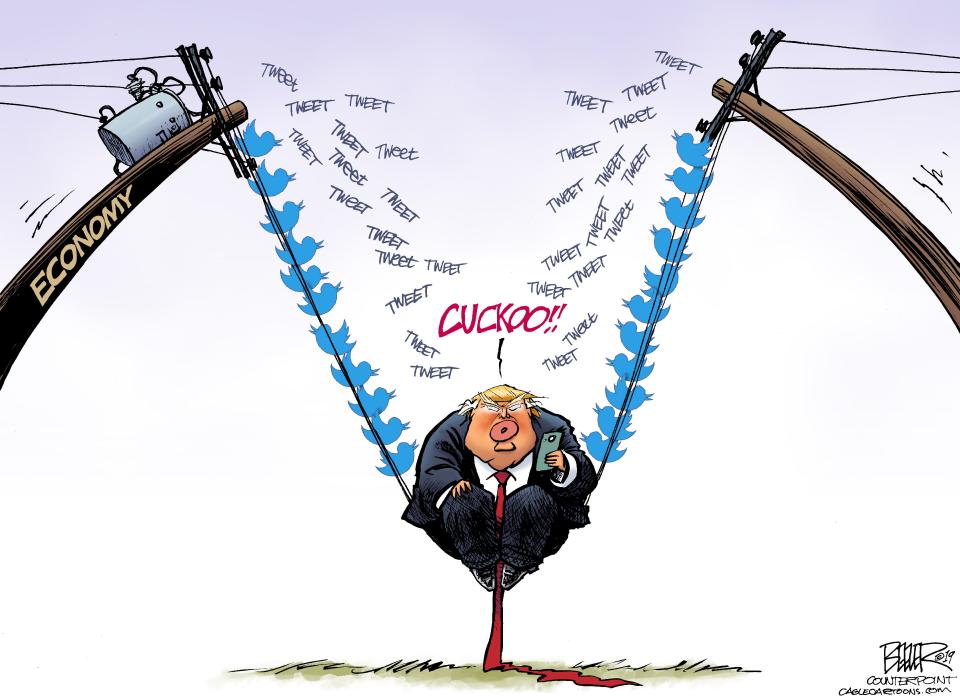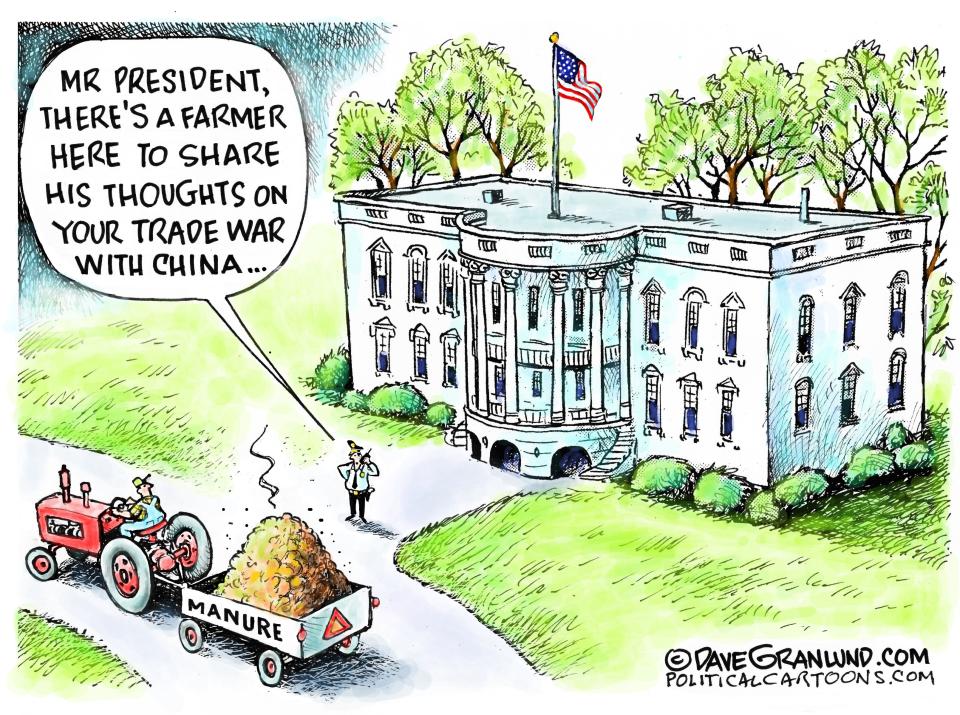China keeps calling Trump's bluff in trade war, and farmers take the hit: Today's talker
The United States and China are engaged in an ongoing trade war fueled by escalating tariffs. President Donald Trump said this week that China is looking for a deal, but Chinese officials deny knowing anything about such a conversation.
Worsening a weak farm economy
By Roger Johnson
In retaliation against the United States’ most recent escalation in an ongoing trade war, China announced that it will increase tariffs on $75 billion worth of American goods, including a number of agricultural products like American soybeans and pork. They will also increase tariffs on corn, sorghum and wheat.
We wrote them, now we have to obey them: Congress must be unafraid to follow the immigration laws we wrote: Today's talker
It’s no surprise that China is slapping even more tariffs on American products. Every time Trump escalates his trade war, China calls his bluff — and why would we expect any differently this time around? And it’s no surprise that farmers are again the target. U.S. soybean exports to China are expected to be one-third of what they were last year, and once these tariffs kick in, things are likely to get worse.
Things have been difficult for farmers long before this trade war rolled around. Farmers' debt has increased by 30% since 2013, taking on record levels of debt just to keep their doors open. The government has offered $28 billion in aid to U.S. farmers, of which about $8.6 billion has been distributed, but it hasn't been enough help.

Chronic overproduction continues to push commodity prices down, and extreme weather events and higher temperatures caused by climate change have made the job of growing food that much more challenging.
Instead of looking to solve existing problems in our agricultural sector, this administration has just created new ones. Between burning bridges with all of our biggest trading partners and undermining our domestic biofuels industry, President Trump is making things worse, not better.
Roger Johnson is president of the National Farmers Union. This column originally appeared in the Wisconsin State Farmer.
What others are saying
George F. Will, The Washington Post: "In a trade war, as in a real one, people are wounded by friendly fire from their side. ... Is John Deere 'tired of winning,' as Trump promised that all Americans soon would be? Not exactly. ... U.S. farmers are buying fewer farm machines — Deere & Co.’s profits from this business are down 24% from a year ago — partly because farmers’ incomes have suffered as a result of the tit-for-tat trade spat that Trump started with China. ... Some good news for John Deere might be ominous news for U.S. farmers: Equipment sales to Brazil and Argentina are up, perhaps partly because China has increased purchases from those nations’ farmers, who are U.S. farmers’ competitors. (This is) a warning for protectionists who seem oblivious."
G. William Hoagland, USA TODAY: "Clearly, China engages in unfair trade and investment practices, preventing U.S. companies from competing on a level playing field and hurting U.S. workers, and the administration is correct to press for solutions to these long-standing issues while also de-escalating economic tensions and removing broad unilateral tariffs. But like two heavyweight boxers, the fight seems destined to last the full 15 rounds with no knockout and no winner in sight. The Chinese government appears in fact willing to go into extended rounds and wait out Trump until after next year’s elections. While the president's patience is clearly limited by that election calendar, the Chinese have a maxim that 'with time and patience, the mulberry leaf becomes a silk gown.' "

San Francisco Chronicle, editorial: "The president’s mercurial, multifront prosecution of trade hostilities reduces the likelihood that they will end soon or succeed in addressing legitimate U.S. grievances with China’s unfair practices. The administration has tried to assuage growing discontent with $28 billion in farm bailouts over the past two years ... but the program is insufficient, inefficient and biased toward bigger, richer farms. As the California Farm Bureau has noted, the surest way to help farmers — along with the rest of the economy — would be to end the trade war."
What our readers are saying
Tariff wars: where the U.S. slaps a tariff on countries resulting in their slapping tariffs on U.S. products, resulting in U.S. companies and workers needing U.S. welfare which the U.S. in turn borrows from the countries on which it slaps a tariff. Win-win for the other countries.
— Kathy Pease
The trade war will end when China eventually and inevitably caves. China needs America far, far more than America needs China. China has been harming America for 30 years, and we finally have a president willing to do something about it.
— John Carter
They all voted for him. Now reap the benefits of that decision.
— Ron David
I own land in Tennessee that is sometimes used for soybeans, and my wife has land in Illinois that is also used for soybeans. Now reap the benefits of that decision. The problem is not Trump's "trade war" but rather a convoluted agribusiness philosophy. ... The answer is not to keep selling American farm products overseas; it's to diversify into crops Americans need.
— Sam McGowan
You can read diverse opinions from our Board of Contributors and other writers on the Opinion front page, on Twitter @usatodayopinion and in our daily Opinion newsletter. To respond to a column, submit a comment to letters@usatoday.com.
This article originally appeared on USA TODAY: American farmers suffer friendly fire in US-China trade war: Talker

